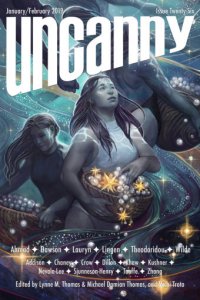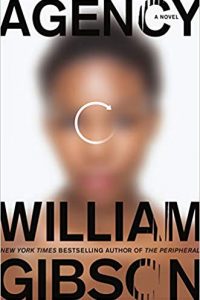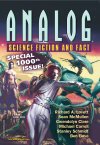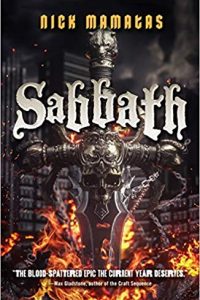Rich Horton Reviews Short Fiction: Uncanny, F&SF, Interzone, Galaxy’s Edge, and Granta
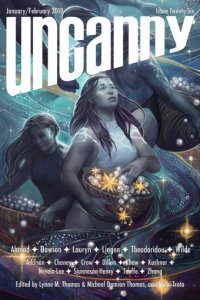 Uncanny 1-2/19
Uncanny 1-2/19
F&SF 1-2/19
Interzone 1-2/19
Galaxy’s Edge 1/19
Granta Autumn ’18
Uncanny in January-February features a challenging story from Fran Wilde. (The last time I wrote about Wilde’s work I called both stories I covered “challenging.” I am sure I did it on purpose, and I am even surer Wilde does it on purpose.) “A Catalog of Storms” is built around names given to different kinds of storms that menace a seaside village, but the story concerns the “weathermen” of that village, people who have been transformed into denizens of the air, who protect the town from those storms. Sila’s great aunt was one of the first weathermen and her Mumma is terrified that she’ll lose one of her daughters the same way. Sila’s sister Lillit is shown transforming in the opening sequence, to her Mumma’s horror, and Sila harbors an ambition to do the same. The story concerns the stress between the heroic life and the mundane, perhaps, but more than that, it is involved with language, and with letting go.
I also liked Marissa Lingen‘s “The Thing, With Feathers“, which is set in a weirdly post-apocalyptic world – a magical apocalypse. Val is a lighthouse keeper on a lake, once a sort of magical doctor, struggling to maintain belief in a possible future. A man comes to her place by the lake, a stranger asking for her help. The story, quiet, understated, really portrays the blossoming of something that might be friendship, and, maybe a bit of, well – the thing with feathers.
Speaking of “challenging,” the January/February F&SF is a strong issue through and through, which features several stories that are borderline horror, with the horror turning on the question of personal responsibility. Adam-Troy Castro‘s “Survey” is one of those stories told entirely in dialog, depicting a college student taking a survey, seemingly one of those psychology research projects, this one an “exploration of stress on the human animal.” The means of putting stress on the young woman in the story is quite horrifying (I leave it to the reader to learn it), and when it’s married with a certain ambiguous offer of a kind of power, the questions the story asks – about the nature of responsibility, I suppose – become even more queasy-making.
Pip Coen‘s “The Fall from Griffin’s Peak” is a nicely told and somewhat more conventionally structured story about a thief in a typical fantasy city who is hired by a rich man to steal a griffin’s tear – supposedly an impossible task. The griffin’s tear has the power to cure any illness, which leads to a double-cross attempt, and then there’s a little twist, which leaves the thief wondering about, again, responsibility. This theme is part of Sean McMullen‘s “The Washer from the Ford” too. A computer professional encounters the title character, a fey the sight of whom presages one’s death, and unexpectedly gains the knowledge of why his life has been cursed. The curse is simple – he is never noticed by other people without directly forcing their attention; and the cure is interesting – he gets the power to understand other people’s thoughts (and notices they never concern him). Of course, this sort of curse isn’t always a burden – and combined with the power to know the thoughts of others, it can certainly have uses – for good, or for ill. So, again, there’s a burden of responsibility.
One more story shares a structure, to an extent, with Castro’s. Erin Cashier‘s “Fifteen Minutes from Now” is a monologue by a time traveler addressing a terrorist, who needs 15 minutes to persuade the terrorist to give up information to stop a crime. How will this work? Well, that’s when the horrific aspect arises – torture. But most people can survive 15 minutes, right? Only, what if the time traveler can keep going back in time, and keep trying? And, then, what torture is really effective?
The January-February Interzone includes a funny, clever, piece by a writer new to me. Interzone stories often have a different flavor to what we see in other publications, which is partly a joke when applied to “The Fukinaga Special Chip Job” by Tim Chawaga, but it’s true in general. This story is about a search through a variety of NautiCities (floating cities) for an 80-year-old bag of a secret flavor of chips. As one might guess, the story is satirical, and to good and very amusing effect. Sean McMullen is here as well, with “Terminalia“, a rather Gothic-flavored story in which a doctor in 1905, who is a pioneer in reviving patients whose hearts have stopped, is recruited (somewhat forcefully!) to assist in a rather more extreme form of revivification – and to join in a war between rival mechanical zombies of sorts. The story holds the interest, but in the end seems a bit overwrought.
Galaxy’s Edge in January is one of those issues that is readable from top to bottom, but never quite outstanding. I did notice, in some of the stories, a family resemblance to the classic SF magazine with which this newer magazine almost shares a title: Galaxy. For example, new writer Christopher Blake, in “What You Won’t Remember“, speculates on the effect that people with considerable empathetic abilities, married to an ability to take a person’s traumatic memories from them, might have on society, especially a society malformed by global catastrophe. Some interesting ideas here, though the story’s central conflict is a bit clichéd. Also interested, but in the end a bit thin, is Alvaro Zinos-Amaro‘s “All Show, No Go“, about a man who inherits an unexpectedly sophisticated AI from his estranged father. The AI can perfectly duplicate things, including rare pulp magazines, and the man and the AI use that ability to make a fortune – but, of course, there are unexpected consequences.
I like to keep an eye on literary mainstream magazines for pieces with SFnal interest. In the Autumn Granta, Jess Row‘s “Radical Sufficiency” worked for me. It seems to be set about 15 minutes in the future, as they say (though not like Erin Cashier’s story!), and it’s about a couple of smart teens in New Jersey who have invented robot sex, and found a way to monetize it. The story is a pretty sharp and funny look at the now very popular high school robotics competitions, and a look at Keerthana and Lyle and Rachel, who make a sort of geeky love triangle, and who are smart enough to get into, say, Stanford on a full ride, and who are not quite neurotypical but not stereotypically so. It’s a really fine story, quite funny, and captures the characters and their voices really well, with just enough extrapolative and philosophical heft to give it weight.
Recommended Stories
“Fifteen Minutes from Now”, Erin Cashier (F&SF 1-2/19)
“Survey”, Adam-Troy Castro (F&SF 1-2/19)
“The Thing, With Feathers”, Marissa Lingen (Uncanny 1-2/19)
“Radical Sufficiency”, Jess Row (Granta Autumn ’18)
“A Catalog of Storms”, Fran Wilde (Uncanny 1-2/19)
Rich Horton works for a major aerospace company in St. Louis MO. He has published over a dozen anthologies, including the yearly series The Year’s Best Science Fiction and Fantasy from Prime Books, and he is the Reprint Editor for Lightspeed Magazine. He contributes articles and reviews on SF and SF history to numerous publications.
This review and more like it in the March 2019 issue of Locus.
 While you are here, please take a moment to support Locus with a one-time or recurring donation. We rely on reader donations to keep the magazine and site going, and would like to keep the site paywall free, but WE NEED YOUR FINANCIAL SUPPORT to continue quality coverage of the science fiction and fantasy field.
While you are here, please take a moment to support Locus with a one-time or recurring donation. We rely on reader donations to keep the magazine and site going, and would like to keep the site paywall free, but WE NEED YOUR FINANCIAL SUPPORT to continue quality coverage of the science fiction and fantasy field.


